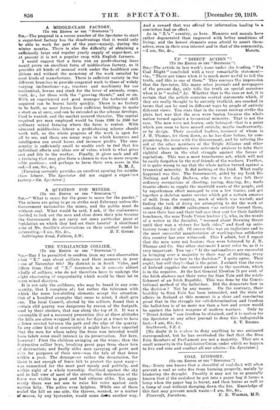THE UNBALANCED COLLIER.
[To THE EDITOR OF THE " SPECTATOR."'
in,—May I be permitted to confirm from my own observation e hat " X." says about colliers and their manners in your izeue of November 8th? My district is in South Wales, and differs from that of " X." inasmuch as it consists alinost wholly of colliers, who do not therefore have to undergo the ..light chastening of unpopularity which would be their lot in more mixed districts.
It is not only the evildoers, who may be found in any com-
munity, that I complain of; but rather the tolerance with which the more law-abiding elements accept the situation. Out of a hundred examples that come to mind, I shall give one. The local Council, elected by the colliers, found that a certain cliff quarry was dangerous by reason of the footpath, used by their electors, that ran along the top of it. It was a reasonable if not a necessary precaution (for at these altitudes the hills are often wrapped in mist for days at a time) to have a fence erected between the path and the edge of the quaryy. In any other kind of community it might have been expected that the men for whose safety the fence was intended would have taken some small interest in its preservation. Not here, however! First the children swinging on the wires; then the destructive collier boys, breaking great gaps from sheer love of destruction; and finally older men carrying off posts and wire for purposes of their own—was the tale of that fence within a year. The damage—or rather the devastation, for there is not enough of fence left to protect the most wary— was committed for the most part openly and publicly, and within sight of a whole township. Outlined against the sky and in full view of most of the streets, the destruction of the fence was visible to good and bad citizens alike. Yet appa- rently there was not one to raise his voice against such wanton folly. The police were helpless. While one of them pealed the hill on one side, the thieves, warped, as a matter of course, by any bystander, would come down another way.
And a reward that was offered for information leading to a conviction had no effect.
As in " X.'s " country, so here. Manners and morals have rather degenerated than improved with better conditions of living; and the honest elements seem afraid to assert them- selves, even in their own interest and in that of the community. —I am, Sir, &c.,






































 Previous page
Previous page